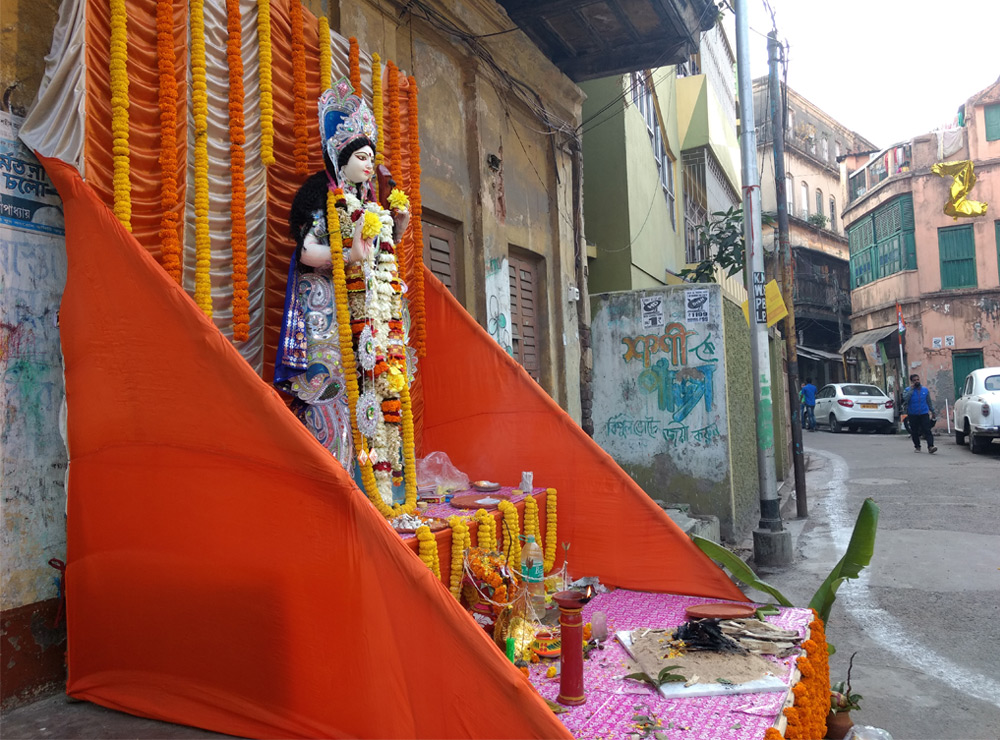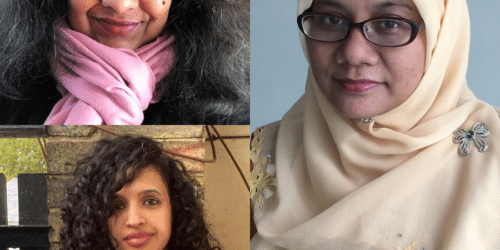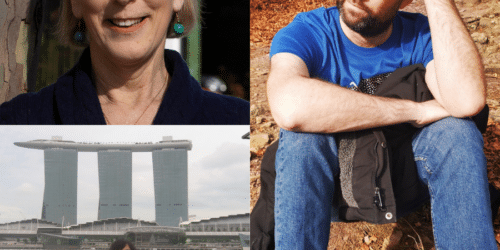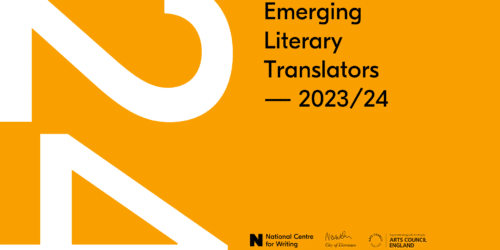
In January 2018, we returned to India for the Kolkata Literary Meet. Here, NCW Programme Assistant Flo Reynolds shares her experience of the trip.
In January I had the opportunity to travel to Kolkata to support the Writing Places project, supported by British Council and Arts Council England. This stage of the project, which seeks to foster literary exchange between Kolkata and Norwich, saw poet Tiffany Atkinson and photographer Sarah Hickson explore the city, connect with local artists and participate in the Kolkata Literary Meet. WCN Associate Programme Director Kate Griffin and I were also able to meet up with several writers and translators who have worked with WCN over the years. It was a real privilege to join this leg of the exchange and see the other city that has been inspiring the Writing Places commissioned artists.
Monday
This afternoon we gathered at the hotel to meet up with Somrita Ganguly, who has been something of a legend to us at WCN ever since her Emerging Translator Mentorship in 2016. Somrita kindly took us to northern Kolkata where we met up with her student Pritam, and together they showed us around the streets of Sovabazar. We found streetside Saraswati idols, houses painted with playful graffiti, and garlanded doorways around every corner. After a quick chai stop, we passed into the potters’ colony at Kumartuli where idols are bunched from straw and sculpted from clay. Here we stumbled upon headless deities-to-be, and Sarah found an impromptu street party to photograph. Eventually we made our way down to the Hooghly, and watched the sun sink behind the factories of Howrah, before catching the ferry and visiting Mullick Ghat Flower Market. Great ropes of marigolds glowed under fluorescent lighting, and flower sellers threaded dahlias and rosebuds into garlands despite the late hour.
Tuesday
This morning we made our way to the Victoria Memorial for the first day of the Kolkata Literary meet. Mandakranta Sen and Samit Basu, who both visited Norwich in May last year as part of the project, and Tiffany took to the stage to discuss the role of geographies, real and fantastical, in crafting a poem or narrative. Tiffany made a case for considering language itself as poetry’s terrain, and Mandakranta and Samit explored how real world geopolitics manifest not only in their work, but in the publishing industry and prize culture.
Following this Samit took us for lunch, where we also met up with Chirodeep Chaudhuri, the Mumbai-based photographer who would be in conversation with Sarah later that afternoon, and Kolkata-based writer Jash Sen. Chirodeep gave us a tour of his exhibition with Jerry Pinto, In The City, A Library, which shows the long-forgotten books of a Mumbai library and the chance ephemera they contain – some pressed flowers, a tram ticket, a note about the benefits of homeopathy. Chirodeep’s project spoke wonderfully to Sarah’s work, in which she seeks a connection between photographer and subject, with place often informing this connection. Their event later that evening, “A Lens for a Pen”, was a perceptive exploration of the storytelling possibility of photography.
Wednesday
This afternoon we paid a visit to Jadavpur University and met up with Shivani Darbari from the British Council and Dr Rimi Chatterjee of JU. Tiffany led a poetry workshop for some of Rimi’s students, who made writing beautiful poems appear absolutely effortless. Tiffany then guided them through a collaborative exercise inspired by Tristan Tzara’s Dadaist poetry method, and everyone was keen to share the bizarre and brilliant results of their remixed, collaborative poems.
After a brief wander around the university campus (almost every wall of which was papered with posters, graffiti, and an occasional stanza by Dylan Thomas) and the wide, peaceful streets of Ballygunge, we met up with Samit, who took us to a popular tea room for a slice of cake. We traded stories of book tours, train journeys across India, and the bizarre questions children ask authors when they visit schools. The joys and challenges of being a writer were, apparently, universal.
Thursday
We started today at the quite astonishingly beautiful Park Street Cemetery, where Somrita met us and showed us the cemetery’s notable and very impressive tombs. David Szalay, also attending the Kolkata Literary Meet after he’d met festival director Malavika Banerjee at the International Literature Showcase, was able to join us before his first event at the festival, and we spent a pleasant couple of hours wandering the cemetery and then perusing the Oxford Book Store.
After a stroll round New Market along with Somrita and Sarah, Tiffany and I made our way to the British Council offices, where Tiffany delivered another Dada-inspired workshop. This time the students were at the start of a beginners’ creative writing course. Some of the students had never written a poem before, but their talent shone through and we ended the workshop with some really wonderful collaborative pieces.
Friday
We met up with Sirsho Bandopadhyay, writer in residence at the BCLT Summer School Bengali workshop in 2017, who had agreed to show us Kalighat and the temple of Kali. After removing our shoes and washing our hands in Ganges water, we were shown past the temple flower stall, up the steps and into the temple. A small crowd was squeezed into the thin corridor tiled in swirling rose-pink and peacock-green. Shuffling forward, a narrow break in the wall revealed Kali’s idol, whose three orange eyes bore into us each in turn. Women threw bright garlands to the idol over the heads of their neighbours. Only a few seconds passed, and we were jostled us through and out the other side of the temple. Kali’s orange eyes followed us, in street art, wrought iron railings, roadside shrines, for the rest of the day.
Saturday
Our Kolkata Literary Meet event, ‘Mapping Stories’, took place at the Victoria Memorial this morning, and it seemed the perfect day to spend taking in the final day of the festival. We caught the first half of David’s event before making our way to the other stage. There, Sarah and Tiffany were in conversation to discuss their approaches to the Writing Places project. Tiffany read two poems, and spoke about navigating geographical specificity with translators rendering her work in Bangla. Sarah spoke of place as a way to get to know the subjects of her photographs, and the triangle of connection this allows between subject, camera, and photographer.
I spent much of the rest of the afternoon enjoying the festival, attending events ranging from a book launch to a film screening. During the Best Asian Short Stories event, publisher Zafar Anjum remarked that “being a writer is like being a start-up”, something I’d never considered before but which seemed to fit: the long hours honing one’s skills, the resilience needed when seeking to publish, and the drive to take seriously the creative industries back home. Exploring the Victoria Memorial grounds, I found gaggles of tourists and teenagers, families and young literature enthusiasts gathered in the gardens, queueing to enter the memorial and drifting between the festival stages. How wonderful to offer such a varied and open festival – featuring the likes of India’s youngest novelist, famous cricketers, and Instapoets – right in the heart of the city.







